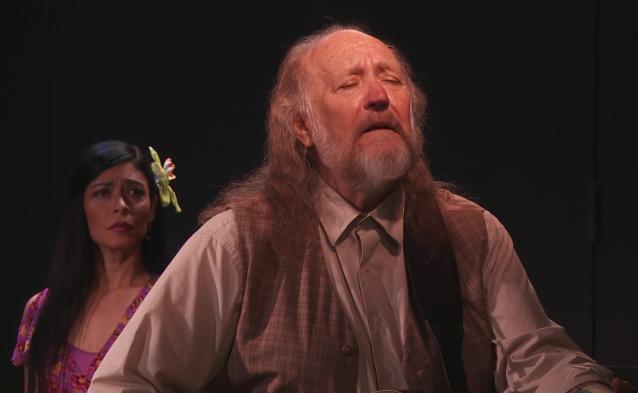Dudley Cocke, artistic director of Roadside Theater, notes that “as August’s white supremacist events were unfolding up the interstate in Charlottesville, we were at home in the coalfields of central Appalachia with the Pregones Theater ensemble from the Bronx in residence.” The occasion was the premiere of the concert version of two ensembles' co-created off-Broadway musical Betsy!
At the top of the show, Betsy, played by Caridad de la Luz, gets the worst possible news: she's part white and will have to deal with it.
Since 1975, Roadside has been performing original plays for poor, working-class, and middle-class audiences across 45 states. Our intercultural body of work has been co-created with African American, Latino, and Native ensembles, which similarly situate their drama in deep, place-specific cultural traditions.
Colleagues have been known to wonder aloud if maybe Roadside doesn't take the role of theater (and by extension art) too seriously. After all, they say, it’s just play, and nobody really dies on the stage (or the big screen).
Here’s Roadside's problem with that: Culture is more powerful than politics, because who controls the culture, controls the stories the nation tells itself. The untrue stories we have been told, have come to believe, and now elaborate as artists and citizens are a core historical problem for our country.
In September 2017, American Theatre magazine asked Dudley for an interview for a forthcoming article about how our current polarized politics “in the Age of Trump” shine a spotlight on the social and cultural work of theatremakers. Here is the excerpt of the interview the magazine printed: http://www.americantheatre.org/2017/10/24/the-resistance-runs-deep/
And here in its entirety is the interview.
American Theatre: What are you/ your company working on right now?
Dudley Cocke: As August’s white supremacist events were unfolding up the interstate in Charlottesville, Virginia, Roadside Theater was at home in the coalfields of central Appalachia with the Pregones Theater ensemble from the Bronx in residence. The occasion was the premiere of the concert version of our co-created off-Broadway musical Betsy! The character Betsy is played by popular Bronx spoken-word artist Caridad de la Luz/La Bruja, and as the play opens Betsy is notified by two shape-shifting Spirits that she is half Irish – the last thing in the world she wants to hear. Her struggle to come to grips with the racism in her own bloodline is told with 18 original compositions ranging from Old Time Mountain to contemporary Caribbean Jazz. The performances received standing ovations from our working class audiences.
AT: How has Trump's election impacted your company? (The ways you work, the subject matter of performances, etc.)
DC: Trump’s triumph has placed in bold relief the American theater’s abandonment of any serious effort to develop a theater that reaches all people and places – in the words of WPA Federal Theater Director, Hallie Flannigan, “national in scope, regional in emphasis and democratic in American attitude." It is worth noting that 85 of the poorest counties in the U.S. are rural. The nonprofit theater today is overwhelmingly the product of the wealthiest and most educated 15 % of the urban population, and thus it has sealed itself off from the possibility of being a dramatic forum for the issues that concern the majority of Americans. The American theater has become its own gated community, unwilling to entertain the larger American story.
AT: What is protest theatre, to you? How does your company fit this definition?
DC: Roadside sees itself as more a theater of affirmation than of protest. We continue to be inspired by the 1960s Southern Freedom Movement, especially the principles of the Student Nonviolent Coordinating Committee/SNCC. Since 1975, Roadside has been performing original plays for poor, working class, and middle class audiences across 45 states. Our intercultural body of work has been co- created with African American, Latino, and Native ensembles, which similarly situate their drama in deep place-specific cultural traditions. An example is our ongoing 34-year collaboration with traditional A:shiwi dancers, singers, and storytellers in Zuni Pueblo, New Mexico.
AT: What ways can theatre contribute to the current situation (people becoming less connected with each other, their communities, land, truth, etc.)?
DC: In the main, the American theater refuses to confront its collusion with racism, stark class division, and geographical bias. It refuses to look at the reality of who it serves – and as a songwriter once mentioned, everybody has to serve somebody. It is far-fetched to expect a theater ably serving higher income people to change audiences, but that’s what is often incentivized, with predictable tokenism as the result. The path to a national democratic theater begins with creating a level playing field so many hundreds of culturally specific theaters across the country have an equal opportunity to put down roots. Theaters serving relatively wealthy urban audiences are themselves culturally specific, however often they claim universality for purposes of domination. With equally healthy roots, diverse culturally specific theaters will eventually, and naturally, discover where their roots intertwine. Roadside’s intercultural collaborations bear witness to this principle.
AT: How are you adapting to the current situation, with politics and performance overlapping in so many ways?
DC: For disenfranchised communities, politics and performance have always overtly overlapped -- although sometimes plays originating in exploited communities are white-washed for elite audiences. The ruling class instinctively understands that who controls the culture controls the story the nation tells itself, which is why the right-wing stepped up the culture wars at the moment of Reagan’s election to power in 1980. Of course, this war continues today, as Trump dutifully reminds us. The American story that we’ve been telling ourselves has been short on the nation’s founding history of genocide, slavery, and Jim Crow, with Crow today embodied in our high number of imprisoned men and women.
In the current political climate, Roadside continues to ask its theater colleagues: Who gets to tell what stories to whom?
